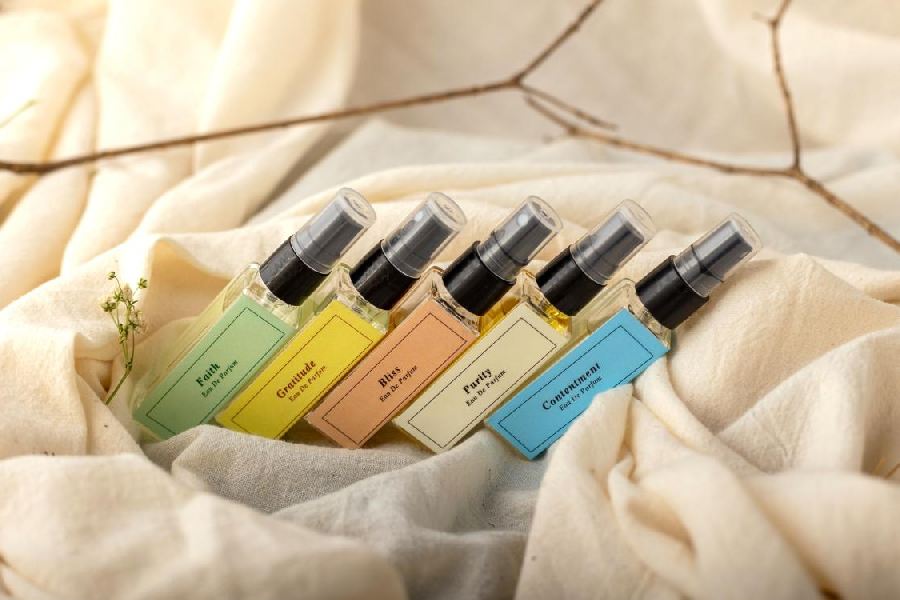It is said if one smells nice, one is in high spirits and is likely to be loved more. And, therefore, it is essential to choose one’s fragrances carefully too. While so many perfume brands jostle for our attention in the crowded market today, Lucknow-based boutique fragrance house ISAK (derived from the Hindi word ishq) is trying to create its own niche. Influenced by five generations in the business of perfumery, the artisanal brand from the heartland of Uttar Pradesh goes back to its roots and strives to stay true to its traditions. The brand that calls itself a progressive label still uses “traditional infusion and distillation techniques” for extracting many of its essences. The old-school method is followed by measuring, blending and formulating fragrances by hand, a process that makes sure to retain the “note and complexities” of raw and rare ingredients of each blend sourced from nature.
ISAK currently has a range of carefully handmade couture perfumes and reed diffusers. ISAK Fragrances founder Vidushi Vijayvergiya, the 40-year-old sixth-generation entrepreneur is an alumna of IIM Ahmedabad and has an MBA degree from Symbiosis, Pune. Speaking with t2, she talked about her five-year-old brand, the winner of the Craft Brand of the year 2020, what growing up around fragrances means, and her aspirations to create a niche of Indian artisanal fragrances of rare notes and blends. Excerpts.
Fragrance-making has remained a family legacy for you for over 160 years now. How has that influenced you?
I was drawn to this business at a very young age. I was some eight years old when I would be highly intrigued by the queries our customers would come up with at my father’s store in Lucknow. I was mostly on the sales side initially and, hence, had the opportunity to observe the customers’ buying behavior. Owing to being born into such a family, I had the opportunity to learn from close quarters the nitty-gritty of perfume-making, including the ingredients that go into it. We owe it to my great great grandfather Chhunnamal Vijayvergia who brought fame to the family first in the 1850s with his craft of making unique, aromatic attars for the nawabs and rasokdars in North India. He had moved to Uttar Pradesh from Rajasthan due to his strong passion for making scents. At that point of time a lot of activity was happening in Kannauj.

The “emotion” series of the brand.
Why did you want to make gender-neutral perfumes too?
One fine day I told my father that I liked the ones he showed to his male customers or what he presented as male fragrances. I kept wondering whether there was something wrong with me or the fact that male fragrances are meant to attract the opposite gender. You would often find women who like men’s perfumes and it is not the other way round. My father would say that it is a personal choice. Even many international designer brands come up with limited ranges. It seems very important for them that the customers make a quick decision, choose either men’s or women’s. More often than not, social conditioning compels men and women to pick up fragrances that represent their gender. But, in India, the concept has been very inclusive. We can see roses in hands of men in old Indian paintings. A rose is not necessarily feminine and in our culture it represents strength. It is unisex. This is where I got the idea of having a unisex collection that features nine gender-fluid scents. It is a niche market even today. With our gender-neutral range, we leave the option to the customers to choose whatever essences they want to wear. We don’t want to dictate anyone’s choices.
Many people do not have faith in our home-grown perfumes. They consider the foreign brands superior.
I have been to Switzerland and France for my research on the customisation of perfumes. I would always wonder why France was touted as the best in the business. After visiting these countries, I realised how much potential India holds, but we do not present ourselves in the right way. The world knows very little about it. So my idea was to tread the conventional path of my family and tell the world about our country’s unique appeal in this fragrance-making space. India has adopted its own style and taste. Sandal is very native to India and an exotic item for France. At ISAK, we use natural ingredients like patchouli, rosemary, sandalwood, jasmine, apple, lemon, juniper, oudh, saffron, rose, musk, vetiver, agarwood, etc. We do not use any animal extracts in our products. Coming to the debate of expensive international perfumes versus the Indian ones, their perfumes do contain chemicals, contrary to popular belief. India has been using natural ingredients since forever and, in some cases, we are obliged to use lab-made components. At ISAK, we use both natural products and lab-made molecules because if we go 100 per cent natural, there may arise concerns about environmental sustainability. For instance, that may lead to dearth of sandalwood. Besides, the lab-made molecules are tested and free of allergens. ISAK helps connect our consumers back to the nature.
Is there a healthy competition between ISAK and its parent fragrance house, the family-owned business?
There is no competition at all. They mainly deal with crafting fragrances for B2B. They are also engaged in exporting perfumes and making perfumery compositions for various industries.
How did it feel getting such a huge investment (Rs 50 lakh) for ISAK from Shark Tank India Season 1?
Oh, the kind of response we got from consumers was overwhelming. We went out of stock the same night. There was a huge influx of orders over the next three months.
